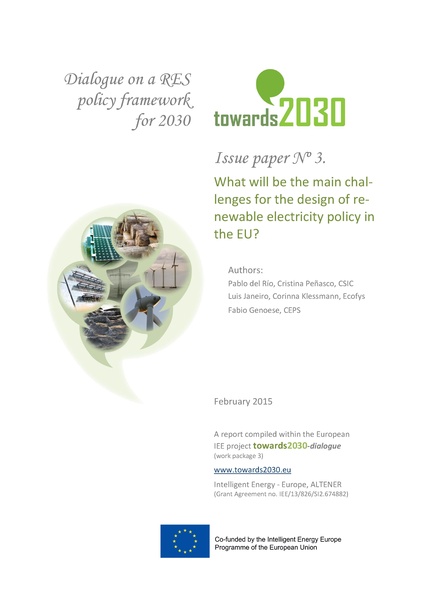File:What Will be the Main Challenges for the Design of Renewable Electricity Policy in the EU?.pdf
 Size of this JPG preview of this PDF file: 424 × 600 pixels. Other resolution: 170 × 240 pixels. |
Original file (2,480 × 3,508 pixels, file size: 767 KB, MIME type: application/pdf, 15 pages)
Summary
Both EU and national policy makers face a difficult task: how to support renewable electricity deployment suc- cessfully (i.e. effectively and efficiently) in the short and medium terms and, in particular, in a 2030 horizon. Such main task is directly and negatively affected by certain factors or challenges which have to be dealt with. Some of these challenges which affect renewable electricity deployment might not be strictly circumscribed to the renewable energy realm or even to the functioning of electricity markets. For example, the economic crisis has put a greater pressure on governments around Europe to promote renewable electricity cost-effectively. There are challenges related to electricity markets and others are associated to external developments. Re- newable electricity policies may still be adopted to cope with some of those challenges. However, those chal- lenges are not the focus of this Policy Issue and are addressed in other work packages of the Towards2030 project. This Policy Issue focuses on the challenges related to policy design (choice of renewable electricity instrument and design element) for future (2030) renewable electricity policy in Europe. Renewable electricity policy chal- lenges are understood as those challenges which comply with two conditions. First, they are directly and indi- rectly related to factors which affect deployment in a 2030 timeframe in the EU. Since we are interested in those challenges which can be tackled by support policies, a second condition applies: the challenges can be influenced by renewable electricity policy. The challenges identified are of different types, and include technologically-related challenges, macroeconom- ic challenges, those associated to the current policy discussion, to administrative barriers and social ac- ceptance. More specifically, the following challenges have been initially considered: how to adapt support levels to trends in renewable energy technology costs and the uncertain evolu- tion of resource potentials, how to appropriately combine R&D support and deployment support for less mature technologies, how to cope with lower budgets for renewable electricity support, problems in accessing finance (credit restrictions), institutional challenges related to the implementation of market-based instruments (MBIs) in general and auctions in particular, making auctions and other market-based instruments effective and efficient, challenges related to target setting (an EU target without MS targets and an EU target with MS tar- gets), merit order effect reducing wholesale prices and revenue for renewable energy technologies , trade-offs between a greater stability and flexibility to adapt to new circumstances, delays in administrative procedures, trade-offs between NIMBY related to renewable electricity concentration and allocative efficiency, social rejection of high or escalating support costs and costs falling disproportionately on a given group of the population. This report proposes some policy measures to mitigate the problems associated to those challenges, focusing on instruments and design elements. Many of these issues are rather complex, however, and, thus, have no simple solution. Therefore, a combination of interventions (in short, policy mixes) will be required. Future re- search and forthcoming reports within the Towards2030 project will further specify the type of policy measures and policy mixes required to meet those challenges effectively and cost-effectively.
Licensing
File history
Click on a date/time to view the file as it appeared at that time.
| Date/Time | Thumbnail | Dimensions | User | Comment | |
|---|---|---|---|---|---|
| current | 08:30, 17 September 2015 |  | 2,480 × 3,508, 15 pages (767 KB) | ***** (***** | *****) | Both EU and national policy makers face a difficult task: how to support renewable electricity deployment suc- cessfully (i.e. effectively and efficiently) in the short and medium terms and, in particular, in a 2030 horizon. Such main task is directly ... |
You cannot overwrite this file.
File usage
The following page uses this file:




















